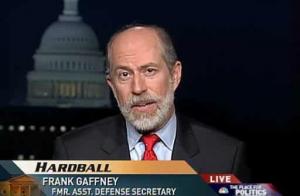I missed this Frank Gaffney column from a couple of weeks ago:
I had an unsettling flashback last week listening to two of the Republican presidential candidates talk about foreign policy. Representative Ron Paul of Texas and former Utah Governor Jon Hunstman espoused isolationist stances that called to mind one of the most preposterous public policy debates in decades.
As I recall, the occasion was a Washington, D.C. event sponsored in the early 1990s by a group of libertarians. A colleague and I were invited to rebut the following proposition: “Resolved, the Constitution of the United States should be amended to prohibit the use of military force for any purpose other than defending the nation’s borders.”
Our side of the debate pointed out that, however superficially appealing such an idea might appear, it was ahistorical, irrational and reckless.
After all, if history teaches us anything, it is that wars happen – as Ronald Reagan put it – not when America is too strong, but when we are too weak. In the run-up to World Wars I and II, we followed more or less the libertarians’ prescription, and disaster ensued.
It continues, but I’ll just home in on the best part: World War I happened, or was worse than it would have been otherwise, because America was following a libertarian — i.e., “isolationist” — foreign policy.
Now, in the 16 years before the outbreak of the Great War in Europe, the United States took part in the Spanish-American War, a savage occupation and counterinsurgency in the Philippines, and various smaller interventions in places such as Panama, Nicaragua, the Dominican Republic, China, and Haiti. What this has to do with the Triple Entente, the Triple Alliance, and the assassination of Archduke Franz Ferdinand is anyone’s guess, but “isolationism” it isn’t.
But Frank Gaffney has been peddling this story for decades. When I was looking for something on his harrowing run-in with libertarians, the World War I thing popped up again. In his opening remarks at a January 1990 Cato Institute debate on foreign policy after the Cold War*, Gaffney said:
I think that it is equally evident that we have tried a policy of disengagement from Europe, a policy known in varying eras as “America-first-ism,” “isolationism,” what have you. And I think our experience is unmistakably clear. It has been a disaster every time it has been tried. The obvious, most glaring cases in point, of course, are World War I and World War II.
Later, in the Q & A portion, an audience member asked:
I have a single, simple question for Mr. Gaffney.
Mr. Gaffney, you suggested that America’s traditional pre-World War I policy of disengagement was an unmitigated disaster in part because it permitted wars on the European continent. In your opinion, at what date before World War I, 1898, 1870, 1848, 1815, whatever, should the United States have entered into formal military commitments to send and station troops in Europe?
To which Gaffney responded:
Well, it’s an interesting rhetorical question. I think that, obviously, at that particular juncture in history, let’s say, prior to 1914, the United States was neither terribly well equipped and certainly not disposed to be a world power. As was evident, starting with 1917, it had the resources to play a major role in restoring what I believe was the proper arrangement — the proper post-war configuration. Unfortunately, I think, in part because it once again withdrew[,] the proper order, the institutions of democracy that flourished briefly in the post-war period did, indeed, fall apart as Chris Layne indicated and gave rise to the seeds of World War II.
Actually, Layne had said that “one could make a very convincing argument that it was precisely the American intervention in World War I that prevented that war from ending in a compromise peace and that gave rise to many of the problems that led subsequently to the rise of Hitler and fascism and thence to World War II, and ultimately to the problems we’re facing now.” Rather different, no? But in Frank Gaffney’s mind, all of this could have been prevented if the United States had dispatched troops to Europe during the Napoleonic Wars. Yes, there are actually people who think like this.
*Sorry, I can’t find a link online. I got this transcript off LexisNexis. Gaffney’s questioner was probably Michael Lind, though the transcriber wrote “Lindt.”




